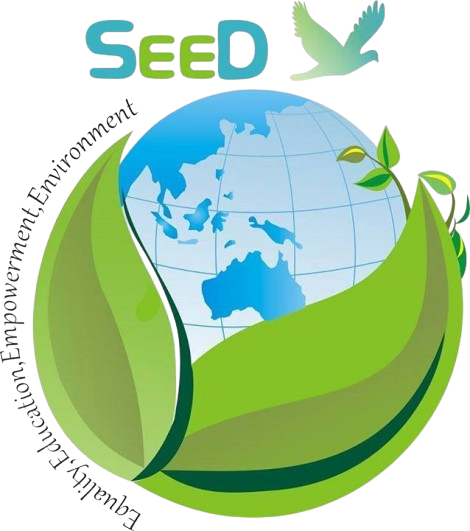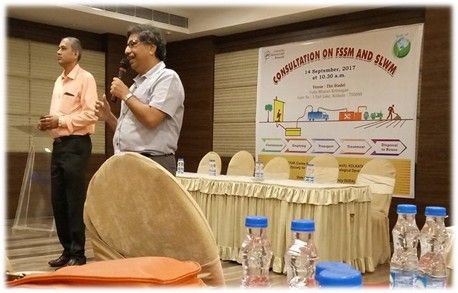






Objective:
To build resilient urban sanitation systems that protect both human health and fragile coastal environments—by integrating faecal‑sludge and septage management with solid‑liquid waste streams, reducing pollution in waterways that feed into the Sundarbans and buffering communities against climate‑driven waterlogging and contamination.
Overview:
In SEED’s Climate‑Smart Sanitation overview, we emphasize how integrated faecal‑sludge and waste management safeguards both people and ecosystems. By ensuring proper desludging and septage treatment, untreated effluent is prevented from entering creeks and estuaries, thereby protecting the water quality and biodiversity of the East Kolkata Wetlands and Sundarbans’ mangrove habitats.
At the same time, decentralized treatment wetlands and co‑composting of organic waste serve as carbon sinks—sequestering greenhouse gases in living biomass and soils and reducing methane emissions from conventional landfills. These natural treatment systems also play a crucial role in enhancing flood resilience: by keeping drains clear and employing green infrastructure such as reed beds and rain gardens, stormwater is more effectively conveyed and absorbed during monsoon surges, reducing inundation risks in low‑lying peri‑urban zones. Ultimately, by strengthening upstream sanitation and waste‑management practices, the programme bolsters vital ecosystem services—healthy wetlands and mangroves can better buffer storm energy, store floodwaters and sustain the ecological functions upon which coastal communities depend.
Key Components:
1. Expert Presentations & Panels – SEED convened leading technologists, policymakers and financiers to share cutting‑edge practices in urban sanitation. Participants saw live demonstrations of low‑energy desludging pumps and modular treatment wetlands, showcasing how compact, nature‑based systems can handle septage with minimal power inputs. These sessions were complemented by in‑depth policy dialogues on “green financing” models—examining innovative funding streams that reward infrastructure delivering measurable ecosystem co‑benefits, such as carbon sequestration and water‑quality improvement.
2. Hands‑On Breakouts – In small‑group “design sprints,” stakeholders collaboratively mapped out alternative sewering solutions tailored to flood‑prone wards. Each team sketched plans integrating rain gardens to detain and infiltrate stormwater, alongside community‑scale composting hubs that transform organic waste into soil amendments. By working through real‑world constraints—land availability, maintenance capacity and budget—participants co‑developed practical blueprints for climate‑resilient sanitation at the neighbourhood level.
3. Field Demonstrations – Attendees visited a pilot co‑treatment wetland where planted reed‑beds and young mangrove saplings jointly polish septage effluent before safe discharge. On‑site experts explained how root‑zone microbial processes break down pollutants, while the mangroves’ specialized pneumatophores and rhizospheres enhance nutrient uptake. This hands‑on tour brought theory to life, illustrating the efficiency and ecological synergy of living treatment systems.
4. Collaborative Road‑Mapping – To translate insights into action, SEED facilitated structured sessions to draft a “Climate‑Smart Sanitation Charter” for municipal adoption. Working together, participants set clear targets for pollution reduction, adaptive management triggers and performance metrics. The resulting roadmap laid out phased timelines, assigned responsibilities across agencies and outlined mechanisms for ongoing monitoring—ensuring that innovative sanitation solutions become entrenched in city planning and budgets.
Impact:
Trained over 200 sanitation professionals—including municipal officers, planners and NGO practitioners—in integrated FSSM and SLWM best practices
Drafted a policy brief adopted by SUDA, outlining new septage‑management bylaws and green financing mechanisms
Identified five pilot zones for demonstration of co‑treatment wetlands and decentralized composting hubs, projected to sequester approximately 200 tCO₂e over five years.
Established a public–private working group with quarterly meetings to oversee implementation and monitor progress
Distributed awareness materials (posters, flyers, desludging‑schedule calendars) to 15 ward committees for community outreach
Enabled SUDA to set stricter discharge standards, cutting fecal‑coliform loads in urban waterways by an estimated 60%
Formed ward‑level “Sanitation Steward” groups, linking public‑health outcomes to healthy ecosystems through green O&M training.
Integrated sanitation upgrades into Kolkata’s 2018 Climate Adaptation Plan, ensuring “environmental resilience” credits in municipal budgets



Subscribe to the SEED Newsletter — and be part of the change!